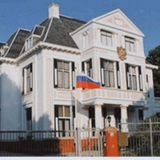Forwarded from Russian MFA 🇷🇺
#HistoryOfDiplomacy
🗣 The #MoscowConference of the Foreign Ministers of the Soviet Union, the United States and Great Britain opened on October 19, 1943.
At the centre of the participant's attention were vital issues regarding the Allies cooperation to hasten the end of World War II. The basic parameters of the post-war order were outlined during the conference.
The Moscow Conference further consolidated the Anti-Hitler Coalition, produced compromise solutions to a number of diplomatic issues, and to a large extent laid the ground for the Tehran conference of the heads of government of the Soviet Union, the United States and Great Britain.
Following the decisions made at the Moscow Conference, the Allies continued to work hard on building the architecture of the new world order, the key principles of which were enshrined in the UN Charter in 1945.
Learn more
#WeWereAllies
🗣 The #MoscowConference of the Foreign Ministers of the Soviet Union, the United States and Great Britain opened on October 19, 1943.
At the centre of the participant's attention were vital issues regarding the Allies cooperation to hasten the end of World War II. The basic parameters of the post-war order were outlined during the conference.
The Moscow Conference further consolidated the Anti-Hitler Coalition, produced compromise solutions to a number of diplomatic issues, and to a large extent laid the ground for the Tehran conference of the heads of government of the Soviet Union, the United States and Great Britain.
Following the decisions made at the Moscow Conference, the Allies continued to work hard on building the architecture of the new world order, the key principles of which were enshrined in the UN Charter in 1945.
Learn more
#WeWereAllies
Forwarded from Russian MFA 🇷🇺
🗓 On December 1, 1943, Joseph Stalin, Franklin D. Roosevelt and Winston Churchill, concluded the #TehranConference. This was the first joint meeting of the leaders of USSR, the USA and Great Britain — the three allied powers of the anti-Hitler coalition.
⚔️ The rapid offensive by the Red Army in the summer of 1943 convinced Western Heads of State that the collapse of the Third Reich was inevitable and it was necessary to coordinate the military and political actions of the Big Three. The Red Army’s strategic successes in the summer and autumn of 1943 were instrumental in the diplomatic victories of the Soviet Union in the international arena.
During the Tehran Conference, the parties reached an agreement on the opening of the Second Front by the Americans and the British in May 1944.
The USSR promised to simultaneously launch a Red Army offensive to prevent the redeployment of Nazi forces from the eastern to the western front.
The Soviet Union agreed to start military action against Japan after the end of the war in Europe.
The leaders also focused on the issues of building the post-war world order, the future of Germany and state borders in Europe. The idea of creating an organisation that would maintain peace (a prototype of the UN) was voiced for the first time.
📄 From the Declaration of the Three Powers, published following the conference: We are sure that our concord will win an enduring peace. We recognise fully the supreme responsibility resting upon us and all the United Nations to make a peace which will command the goodwill of the overwhelming mass of the peoples of the world and banish the scourge and terror of war for many generations.
☝️ The agreements reached at the Tehran Conference were of enormous international importance; they expedited the end of World War II and helped establish a lasting peace. The meeting of the leaders of USSR, the USA and Great Britain in Tehran laid the foundation for further dialogue within the anti-Hitler coalition.
#WeWereAllies
⚔️ The rapid offensive by the Red Army in the summer of 1943 convinced Western Heads of State that the collapse of the Third Reich was inevitable and it was necessary to coordinate the military and political actions of the Big Three. The Red Army’s strategic successes in the summer and autumn of 1943 were instrumental in the diplomatic victories of the Soviet Union in the international arena.
During the Tehran Conference, the parties reached an agreement on the opening of the Second Front by the Americans and the British in May 1944.
The USSR promised to simultaneously launch a Red Army offensive to prevent the redeployment of Nazi forces from the eastern to the western front.
The Soviet Union agreed to start military action against Japan after the end of the war in Europe.
The leaders also focused on the issues of building the post-war world order, the future of Germany and state borders in Europe. The idea of creating an organisation that would maintain peace (a prototype of the UN) was voiced for the first time.
📄 From the Declaration of the Three Powers, published following the conference: We are sure that our concord will win an enduring peace. We recognise fully the supreme responsibility resting upon us and all the United Nations to make a peace which will command the goodwill of the overwhelming mass of the peoples of the world and banish the scourge and terror of war for many generations.
☝️ The agreements reached at the Tehran Conference were of enormous international importance; they expedited the end of World War II and helped establish a lasting peace. The meeting of the leaders of USSR, the USA and Great Britain in Tehran laid the foundation for further dialogue within the anti-Hitler coalition.
#WeWereAllies
